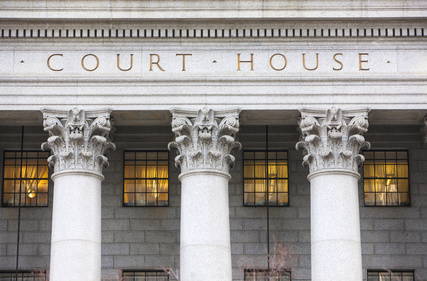 The U.S. Court of Appeals for the Seventh Circuit recently held that the federal Fair Debt Collection Practices Act (FDCPA) does not prohibit debt collectors from filing a collection lawsuit without intending to proceed to trial to obtain a judgment.
The U.S. Court of Appeals for the Seventh Circuit recently held that the federal Fair Debt Collection Practices Act (FDCPA) does not prohibit debt collectors from filing a collection lawsuit without intending to proceed to trial to obtain a judgment.
A copy of the opinion in St. John v. Cach, LLC is available at: Link to Opinion.
The defendant debt collectors filed suit in state court to recover on the plaintiffs’ delinquent credit card accounts. When the debtors contested the collection lawsuits, the debt collectors moved to voluntarily dismiss the actions with prejudice.
The plaintiff debtors then sued the debt collectors in federal court for allegedly engaging in deceptive practices under the FDCPA during the state court litigation. The plaintiffs alleged that the debt collectors violated § 1692e(5) of the FDCPA by initiating state court proceedings with no intention of going to trial to obtain judgments.
The trial court dismissed each of the plaintiffs’ federal actions for failure to state a plausible claim to relief. On appeal, the plaintiffs only raised the question of whether they stated a claim under § 1692e(5) of the FDCPA by alleging that the debt collectors filed suit without intending to proceed to trial to obtain a judgment.
As you may recall, the FDCPA broadly prohibits debt collectors from using any false, deceptive, or misleading representation or means in connection with the collection of any debt. 15 U.S.C. § 1692e(5). Specifically, the FDCPA prohibits making a threat to take any action that cannot legally be taken or that is not intended to be taken. Id. In evaluating an alleged FDCPA violation, the Seventh Circuit looks to whether the debt collector’s communication would deceive or mislead an unsophisticated but reasonable consumer.
The plaintiff debtors argued that filing a lawsuit implies or threatens that the case will go to trial to obtain a judgment. The plaintiffs asserted the time to gauge the debt collector’s intent to proceed to judgment was at the time it filed the complaint.
The plaintiffs alleged that the debt collectors impermissibly filed suit hoping for a settlement or default judgment, as evidenced by their decision to voluntarily dismiss the actions once the plaintiffs became involved in defending the litigation.
However, the Court noted that the plaintiffs never alleged that the debt collectors represented anywhere in their state court complaints that they intended to go to trial to obtain a judgment. In addition, the Court also noted there was no indication that the debt collectors failed to file their complaint in good faith.
Thus, the Seventh Circuit held that the plaintiffs failed to state a viable claim under the FDCPA. The Court held that the plaintiffs did not sufficiently allege that the defendants did not intend to proceed to trial when they initially filed their complaints in state court. The Seventh Circuit noted that the fact that the defendants voluntarily moved to dismiss their suits prior to trial did not suggest that they had no intention of ever going to trial, indicating there are many reasons why a litigant would want to dismiss its own case.
Additionally, the basis for the plaintiff debtors’ allegations were based on speculation, which is not a well-pleaded factual allegation supporting a plausible claim to relief.
The Seventh Circuit also found that the plaintiffs’ allegations failed because they did not show that the defendants ever threatened to go to trial. The Court held that the mere filing of a civil action does not include an implicit statement (i.e., a threat) that the plaintiff intends to advance the action all the way through trial. In so ruling, the Court recognized that litigation is a process in which recovery can be achieved at many stages of said process.
The Seventh Circuit also noted that a plaintiff likely hopes to recover at a less cumbersome stage, such as settlement or default judgment, rather than go through the expense, inconvenience and uncertainty of trial. The Court held this is not trickery or a threat; it is a legitimate exercise of a plaintiff’s discretion, and debt collectors who sue to recover a debt are not different from any other plaintiff in this respect.
The Seventh Circuit refused to hold that a debt collector who determines it would be less cost-effective to go to trial would be liable for an FDCPA violation for simply filing a complaint. The Court noted that the FDCPA does not compel this incongruous result, and that § 1692e(5) does not punish debt collectors for engaging in a cost-benefit analysis when conducting litigation.
Moreover, the Seventh Circuit noted that, under Illinois law, the debt collectors in this case were allowed to voluntarily dismiss their actions at any time before trial, for any reason. 735 ILCS 5/2-1009(a).
In the alternative, the plaintiffs argued that the trial court applied the incorrect legal standard in dismissing their actions under Rule 12(b)(6) and Rule 12(c). This argument failed because the Seventh Circuit independently applied the proper legal standard de novo and reached the same result as the trial court.
In sum, an unsophisticated consumer could not reasonably conclude that a debt collector implicitly threatens to proceed to trial simply by filing a lawsuit to recover a debt, and the plaintiffs failed to state a plausible claim under § 1692e(5).
Accordingly, the Seventh Circuit held that the district court did not err in dismissing the claims with prejudice, and affirmed the ruling of the trial court.


